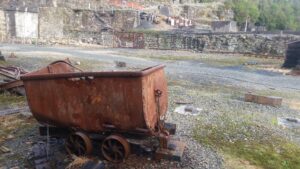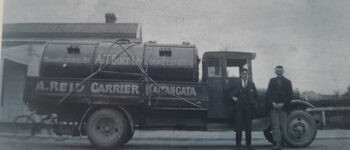1941: From Beer Barrels to Beer Tankers
September 2, 2022
By AHNZ

From antiquity all the way to just after the Second World War our beer has been transported in wooden barrels. This changed in 1941 and we have the photo of it occurring (left.) Initially the new steel tanker technique was used to get the beer from brewer to bottling plant. It was an idea that soon spread. In 1941 Christchurch’s Speights brewery followed suit and also arranged for the first direct brewery-to-hotel delivery to be made to a beer tank at the Carlton Hotel (Bealey Avenue and Papanui Road, demolished 2011.)
According to my source, McLauchlan (1994) these events happened in 1941 but he inconsistently also says 1944. Christchurch City Libraries and Historic Places Trust seem to think the year was 1941. Unfortunately McLauchlan doesn’t provide references for his photo or information.
Bulk beer, McLauchlan writes, was first transported by tanker in New Zealand from the Strachan Brewery in rattray Street, Dunedin, to the McGavin Bottling House in Duke Street. The flat-deck truck was purchased from Mr Alex Reid of Kaitangata and carried a 756 gallon tank fabricated by A.T. Burt Ltd of Dunedin for £320.
Why is this worthy of recording in New Zealand history?
“That was a pioneering move. Within a few years, coopers and their barrels belonged to the pas and beer moved around the country in shiny new tankers.” – McLauchlan (1994)
“A ‘first’ in the country came in 1940 when the hotel drew beer directly from a bulk tank. Later, beer taps on flexible hoses were introduced.” – The Carlton Hotel, Christchurch City Libraries
“The Carlton is traditionally associated with a number of ‘firsts’ in New Zealand’s brewing history, including the serving of the first beer on tap in 1939-1940, the opening of the first beer garden in 1947 and the first drive-through bottle store in 1954.” – Carlton Hotel, NZ Historic Places Trust; Wayback Machine
“For by art is created that great Leviathan called a Commonwealth, or State, in Latin Civitas, which is but an artificial man; though of greater stature and strength than the natural, for whose protection and defence it was intended,..” – Thomas Hobbes
 New Zealand, like any Social Organism, works the same way any plant or animal does. To see the parallisms you only need an abstract mind and it helps to already accept that we live in a Fractal Universe. Everything in our universe built out of the same basic architecture. A town, city, or a country, like a human and the human species itself, can be born or killed. They grow, they develop, they shrink, they adapt, they have their specialised niches.
New Zealand, like any Social Organism, works the same way any plant or animal does. To see the parallisms you only need an abstract mind and it helps to already accept that we live in a Fractal Universe. Everything in our universe built out of the same basic architecture. A town, city, or a country, like a human and the human species itself, can be born or killed. They grow, they develop, they shrink, they adapt, they have their specialised niches.
A country, like your body, has different organs that serve different functions. New Zealand has a nervous system that has evolved from mail delivered by Maori runner to high-speed internet. Light came from candles, then gas, then electricity. New Zealand has a circulatory system that has gone from sailing ships to railways to trucks and aircraft. One of the main things carried to the cells of the body, the people, have been carbohydrates. Beer itself, like bread, is a more highly evolved delivery system for carbs than primitive man had. Moving from gourds to sewn animal pelts to wooden barrels (still called ‘hogsheads’, indicating an earlier system) to steel tanks is a similar evolution in the Social Organism to what has happened in our natural evolution.
 New Zealand, like other nations, has constantly been developing a circulatory system to transport better quality energy around its ‘body’ at higher speeds and greater economic efficiency. When this fails or a town gets cut off from the ‘blood’ supply it withers and dies. We have many ghost towns scattered about and their industrial and residential relics litter abandoned places like fossilised bones in a wasteland. We also have towns busy dying because they have lost their function because their industry has become obsolete or criminalised or prohibited or simply tapped out (eg of gold, eg of coal.) Perhaps the town has been bypassed by the new, more evolved, main arterial routes that carry traffic and now it is more or less unplugged from the main body. There is a prognosis for a town dying the same way there is for a human body. Part a town’s decay appears to involve it becoming a home for low-income residents, criminals, the illegal drug economy, and gangs.
New Zealand, like other nations, has constantly been developing a circulatory system to transport better quality energy around its ‘body’ at higher speeds and greater economic efficiency. When this fails or a town gets cut off from the ‘blood’ supply it withers and dies. We have many ghost towns scattered about and their industrial and residential relics litter abandoned places like fossilised bones in a wasteland. We also have towns busy dying because they have lost their function because their industry has become obsolete or criminalised or prohibited or simply tapped out (eg of gold, eg of coal.) Perhaps the town has been bypassed by the new, more evolved, main arterial routes that carry traffic and now it is more or less unplugged from the main body. There is a prognosis for a town dying the same way there is for a human body. Part a town’s decay appears to involve it becoming a home for low-income residents, criminals, the illegal drug economy, and gangs.
Before WW2 New Zealand moved its goods in things like minecarts (image, right) and cream cans and beer barrels. Moving goods this way was a time-consuming and arduous task relying on muscle power. This is why the beer tanker was a new step in our evolutionary development.
Stan Goosman’s motorways were a huge step up. Likewise, when New Zealand stopped using scramble nets to load and unload cargo, moving to containers. Also, the creation of the Refinery Auckland Pipeline from Marsden Point, Whangarai, to Wiri Oil Terminal, South Auckland, was a great advance in New Zealand’s Hobbsean ‘food’ delivery system. Having healthy and more highly-evolved infrastructure like this is how we know our Social Organism/country is doing well and is not a sick, dying, man of the South Pacific. When roads are broken and not repaired, speed limits reduced, and pipelines broken and the great digestive stomach, Marsden Point Oil Refinery, is amputated we can know our country is in desperate trouble.
—
Image ref. p23 The Story of Beer, Gordon McLauchlan (1994)
Image ref. Fossils of a ghost town, Denniston. Showing an old mine cart which was a more primitive and early sort of blood cell in the animal New Zealand used to be; AHNZ Archives (2021)
Image ref. Refinery to Auckland Pipeline (RAP,) from a scale model at Marsden Point. E-Library NZ, Facebook (2016)
Ref. The Story of Beer, Gordon McLauchlan (1994)
Ref. The Social Organism, Herbert Spencer (1860)
Ref. “The new company said the decommissioning project was more than 70 per cent complete, and the plant has effectively been dismantled internally. Only the shells and structures remain,” – Not a mothballing’: Impossible to restart Marsden Pt refinery as more than 70 per cent of decommissioning completed, NZ Herald (August 2022)
 Like Comment Share
Like Comment Share





